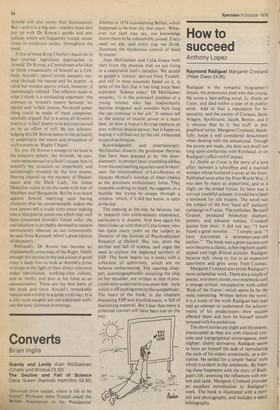Arowsed
Roy Fuller
Matthew Arnold: Poet and Prophet A. L. Rowse (Thames and Hudson £6.50) This critical biography has one great virtue from which its other merits stem—Dr Rowse's power as a historian to see his subject whole and to go boldly for the select material that will best exemplify his view. This is not a long book (neither is it slight enough to be able to avoid difficulties) yet by and large it constructs a fair portrait of Arnold and his age out of a daunting mass of material, both specifically Arnoldian and general. It provides more than a stimulating introduction to its subject: old admirers of Arnold will also surely find illumination. But and it is a big one—readers must also put up with Dr Rowse's quirks and prejudices, which are frequently voiced, sometimes in irrelevant asides, throughout the book.
A few of these King Charles's heads do in fact provide legitimate approaches to Arnold. Dr Rowse. a Cornishman who likes to think romantically of himself as a Celt, rinds Arnold's part-Cornish ancestry running through his nature and his poetry---a valid but modest apercu which, however, is inordinately inflated. The inflation leads to what I think is a misleading argument : the contrast in Arnold's poetry between 'inspired' and 'willed' poems. No doubt something could be made of these categories, carefully argued. hut in a sense all Arnold's poetry is 'willed' poetry or at any rate carried on by an effort of will. By not acknowledging this Dr Rowse seems to me seriously to undervalue the metre and procedure of such a poem as 'Rugby Chapel'.
So, too, Dr Rowse's misogyny (at least in the amatory sphere: the Arnolds, he says, 'were heterosexual to a fault') causes him to simplify the situation so imperfectly and tantalisingly revealed by the love poems. Having cleared up the mystery of Shakespeare and the Dark Lady, the Great Detective wants to do the same with that of Matthew and Marguerite. But he is so much against Arnold marrying (and having children) that he unwarrantably makes the' love poems tell a crude story (even making into a Marguerite poem one which may well have concerned Arnold's future wife): the real situation is probably destined to remain permanently obscure, as can conveniently be seen from Kenneth Allott's great edition of the poetry.
Politically, Dr Rowse has become an unashamedly cross man of the Right. Oddly enough this proves in the end a kind of good since it leads him to look at Arnold's prose writings in the light of their direct relevance today (devolution. working-class culture, and so forth), and also at his force as an educationalist. These are the best parts of the book and show Arnold's remarkable stature and solidity in a quite vivid way. It is a pity such insights are not expressed without the testy clubman trimmings. Address in 1874 (scandalising Belfast, which happened to be host city that year): 'Whatever our faith may say, our knowledge shows them to be indissolubly joined. Every meal we eat, and every cup we dunk. illustrates the mysterious control of mind by matter'.
Alan McGlashan and Celia Green both start from the premise that we are living in a materialist fool's paradox. We accept as gospel a 'science' derived from Tyndall, and still in most essentials based on it. in spite of the fact that it has long since been exploded. 'Science today,' Dr McGlashan remarks. 'is in the awkward position of a young woman who has inadvertently become pregnant and wonders how long she can continue in her job.' It cannot tell us the source of muscle power in a heart beat, or how a Venus's fly-trap captures its prey without muscle-power; but it keeps on hoping it will find out by the old, exhausted research techniques.
Knowledgeably and entertainingly. McGlashan dissects the grotesque theories that have been grasped at by 'the doorslammers' to protect their crumbling edifice from the encroaching squatters and brokers' men: the 'structuralism' of Levi-Strauss, or Jacques Monod's worship of sheer chance as the dominant evolutionary force. They resemble nothing so much, he suggests, as a bumble bee trying to escape through a window 'which, if it did but know, is open at the top'.
The opening at the top, he believes, lies in research into extra-sensory experience, particularly in dreams. And here again his thesis links up with that of Celia Green, who has spent many years on the subject as Director of the Insitute of Psychophysical Research at Oxford. She, too, plots the decline and fall of science, and urges the need to explore the neglected territory of ESP. The book begins (as it ends) with a collection of aphorisms, which are on balance embarrassing. The opening chapters, autobiographically unveiling the chip on her shoulder, are written in that if-youcould-only-understand-you-poor-fish style which is off-putting even to the sympathiser. The heart of the book, in the chapters discussing ESP and psychokinesis, is full of fascinating material. But I fear that many a potential convert will have been lost on the way.



































 Previous page
Previous page